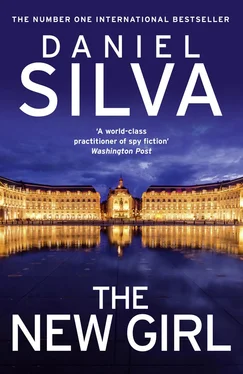The hum of the crowds in MoMA’s atrium temporarily lifted Sarah’s spirits. The Nadia al-Bakari Collection was on the second floor; Sarah’s office, the fourth. Her telephone log showed twelve missed calls. It was the usual fare—press inquiries, invitations to cocktail parties and gallery openings, a reporter from a scandal sheet looking for gossip.
The last message was from someone called Alistair Macmillan. It seemed Mr. Macmillan wanted a private after-hours tour of the collection. He had left no contact information. It was no matter; Sarah was one of the few people in the world who had his private number. She hesitated before dialing. They had not spoken since Istanbul.
“I was afraid you were never going to return my call.” The accent was a combination of Arabia and Oxford. The tone was calm, with a trace of exhaustion.
“I was at lunch,” said Sarah evenly.
“At an Italian restaurant on Park Avenue with a creature named Brady Boswell.”
“How did you know?”
“Two of my men were sitting a few tables away.”
Sarah hadn’t noticed them. Obviously, her countersurveillance skills had deteriorated in the eight years since she had left the CIA.
“Can you arrange it?” he asked.
“What’s that?”
“A private tour of the al-Bakari Collection, of course.”
“Bad idea, Khalid.”
“That’s the same thing my father said when I told him I wanted to give the women of my country the right to drive.”
“The museum closes at five thirty.”
“In that case,” he said, “you should expect me at six.”
IT WAS TRANQUILLITY , REPUTEDLY THE second-largest motor yacht in the world, that gave even his staunchest defenders in the West pause for thought. The future king saw it for the first time, or so the story went, from the terrace of his father’s holiday villa on Majorca. Captivated by the vessel’s sleek lines and distinctive neon-blue running lights, he immediately dispatched an emissary to make inquiries as to its availability. The owner, a billionaire Russian oligarch named Konstantin Dragunov, knew an opportunity when he saw one, and demanded five hundred million euros. The future king agreed, provided the Russian and his large party leave the yacht at once. They did so by the ship’s helicopter, which was included in the sale price. The future king, a ruthless businessman in his own right, billed the Russian exorbitantly for the fuel.
The future king had hoped, perhaps naively, that his purchase of the yacht would remain private until such time as he could find the words to explain it to his father. But just forty-eight hours after he took possession of the vessel, a London tabloid published a remarkably accurate account of the affair, presumably with the assistance of none other than the Russian oligarch. The official media in the future king’s country, which was Saudi Arabia, turned a blind eye to the story, but it set fire to social media and the underground blogosphere. Owing to a drop in the worldwide price of oil, the future king had imposed harsh austerity measures on his cosseted subjects that had sharply reduced their once-comfortable standard of living. Even in Saudi Arabia, where royal gluttony was a permanent feature of national life, the future king’s avarice did not sit well.
His full name was Khalid bin Mohammed bin Abdulaziz Al Saud. Raised in an ornate palace the size of a city block, he attended a school reserved for male members of the royal family and then Oxford, where he read economics, pursued Western women, and drank a great deal of forbidden alcohol. It was his wish to remain in the West. But when his father assumed the throne, he returned to Saudi Arabia to become minister of defense, a remarkable achievement for a man who had never worn a uniform or wielded any weapon other than a falcon.
The young prince promptly launched a devastating and costly war against Iran’s proxy in neighboring Yemen and imposed a blockade on upstart Qatar that plunged the Gulf region into crisis. Mainly, he plotted and schemed inside the royal court to weaken his rivals, all with the blessing of his father, the king. Aged and ill with diabetes, the king knew his reign would not be long. It was customary in the House of Saud that brother succeed brother. But the king upended that tradition by designating his son the crown prince and thus next in line to the throne. At just thirty-three, he became the de facto ruler of Saudi Arabia and leader of a family whose net worth was in excess of $1 trillion.
But the future king knew that his country’s wealth was largely a mirage; that his family had squandered a mountain of money on palaces and trinkets; that in twenty years, when the transformation from fossil fuels to renewable sources of energy was complete, the oil beneath Saudi Arabia would be as worthless as the sand that covered it. Left to its own devices, the Kingdom would return to what it once was, an arid land of warring desert nomads.
To spare his country this calamitous future, he resolved to drag it out of the seventh century and into the twenty-first. With the help of an American consulting firm, he produced an economic blueprint he grandly called The Way Forward . It envisioned a modern Saudi economy powered by innovation, foreign investment, and entrepreneurship. No longer would its pampered citizenry be able to count on government jobs and cradle-to-grave benefits. Instead, they would actually have to work for their living and study something other than the Koran.
The crown prince understood that the workforce of this new Saudi Arabia could not be comprised of men alone. Women would be required, too, which meant the religious shackles that kept them in a state of near slavery would have to be loosened. He granted them the right to drive, long forbidden, and allowed them to attend sporting events where men were present.
But he was not content with small religious reforms. He wanted to reform the religion itself. He pledged to shut down the pipeline of money that fueled the global spread of Wahhabism, Saudi Arabia’s puritanical version of Sunni Islam, and crack down on private Saudi support for jihadi terrorist groups such as al-Qaeda and ISIS. When an important columnist from the New York Times wrote a flattering portrait of the young prince and his ambitions, the Saudi clerical establishment, the ulema, seethed with a sacred rage.
The crown prince jailed a few of the religious hotheads and, unwisely, a few of the moderates, too. He also jailed supporters of democracy and women’s rights and anyone foolish enough to criticize him. He even rounded up more than a hundred members of the royal family and Saudi Arabia’s business elite and locked them away in the Ritz-Carlton Hotel. There, in rooms without doors, they were subjected to harsh interrogations, sometimes at the hands of the crown prince himself. All were eventually freed, but only after surrendering more than $100 billion. The future king claimed the money had been acquired through bribery and kickback schemes. The old way of doing business in the Kingdom, he declared, was over.
Except, of course, for the future king himself. He accumulated personal wealth at a dizzying pace and spent it lavishly. He bought whatever he wanted, and what he couldn’t buy he simply took. Those who refused to bend to his will received an envelope containing a single .45-caliber round.
Which prompted, mainly in the West, a great reassessment. Was KBM truly a reformer, wondered the policy makers and the Middle East experts, or was he just another power-mad desert sheikh who was locking away his opponents and enriching himself at the expense of his people? Did he really intend to remake the Saudi economy? End the Kingdom’s support for Islamic zealotry and terrorism? Or was he merely trying to impress the smart set in Georgetown and Aspen?
Читать дальше












